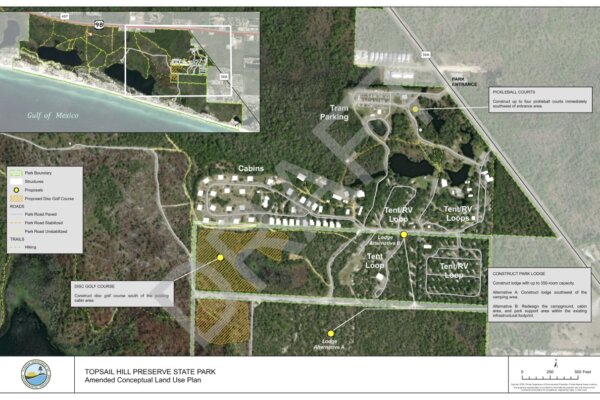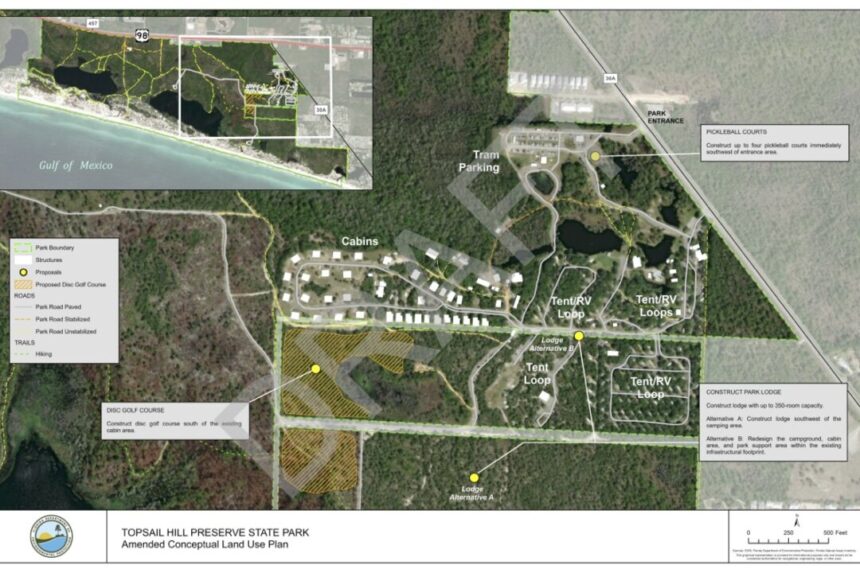
James Gaddis, 41, disclosed what he described as ‘appalling proposals,’ which included plans for new cabins, ‘glamping’ sites, and pickleball courts.
Following the backlash from Floridians against leaked development plans for nine state parks, a man claiming responsibility for sharing the plans has stepped forward.
“These disturbing proposals, which were not set to be made public until the day before the scheduled public meetings, have been put on hold for now, and we are all relieved about that,” Gaddis wrote on a GoFundMe page he set up for himself and his 11-year-old daughter while he seeks new employment.
“As a state employee and single father working a weekend job, I knew that raising the alarm was a risky move. However, I saw myself as a public servant first and believed it was the only ethical choice. This issue became more significant than any individual’s job status with DEP,” he explained.
Gaddis stated that he was instructed to create nine maps outlining “shocking and damaging infrastructure proposals, while being required to remain silent as they were rushed through an accelerated and discreet public engagement process.”
“The department recently became aware that you intentionally released unauthorized and inaccurate information to the public,” the letter stated. “At least one document was created, authored, and disseminated by you without authorization or permission.”
The letter further mentioned that Gaddis verbally admitted to creating the document during working hours.
DEP communications director Alexandra Kuchta declined to comment on personnel matters when contacted by The Epoch Times via email.
Gaddis did not respond to multiple requests for comment from The Epoch Times.
Florida Governor Ron DeSantis stated on Aug. 28 that DEP was “revisiting the plans” and that they were leaked prematurely and “not ready for public release,” without specifying the source of the leak.
“It was not approved by me. I never saw that,” he remarked.
Pickleball and Disc Golf
A leaked document authored by Gaddis was included in his dismissal letter. In it, he mentioned, “The Executive Office of the Governor directed the Office of Park Planning to create nine amendments to existing management plans for nine state parks,” with instructions to expedite the process.
He revealed that these management plan modifications typically required meetings with advisory groups and public forums.
To meet these requirements, he explained, “eight public meetings across eight counties were scheduled for August 27, and an advisory group session was set for Thursday, August 29. The advisory group session was to be held via Teams, where all nine amendments were to be discussed.”
The Park Planning office planned to “play pre-recorded presentations, then gather and record feedback at these meetings without answering questions,” before submitting the plans to the DEP’s Acquisition and Restoration Council for approval.
The proposed plans included the construction of a 350-room park lodge at Anastasia State Park and Topsail Hill Preserve State Park, and the addition of 10 new cabins or “glamping” sites for Camp Helen State Park, Grayton Beach State Park, and Oleta River State Park.
Jonathan Dickinson State Park’s plans involved the development of golf courses and the removal of the already closed Hobe Mountain boardwalk, an observation tower, and a non-functional radar station.
Seven of the nine state parks were set to receive pickleball courts and disc golf courses.
Several of the plans outlined in DEP’s official statement were mirrored in Gaddis’s document, including the proposals for golf courses at Jonathan Dickinson State Park, and the 350-room park lodges at Anastasia and Topsail Hill Preserve.
“The initiative aims to expand public access, enhance outdoor activities, and offer new lodging options throughout Florida’s state parks—demonstrating the state’s commitment to conservation, the outdoor recreation industry, and a high quality of life for Floridians,” DEP stated in its release.
Nevertheless, the plans were met with substantial opposition, with protests planned at the park entrances.
This opposition caught the attention of Senators Marco Rubio and Rick Scott, who criticized the rushed approval process by DEP.
By Aug. 26, DEP announced that the public meetings would be postponed until after Labor Day weekend, and the organization associated with the proposed golf courses had withdrawn.
Approximately 150 protesters gathered on Honeymoon Island on Aug. 27, including representatives from various conservation groups such as Suncoast Sierra Club and the Clearwater Audubon Society.
Plans on Hold
DeSantis urged people to communicate with their community leaders regarding the plans.
“Here’s the thing: I’d rather not spend any money on this, right? I mean, if people don’t want improvements, then don’t do it. And so that’ll be something that citizens could be able to do. They’re not doing anything this year,” he stated.
DEP confirmed on Aug. 29 that the development plans were put on hold.
“At the governor’s direction and following feedback from the public, the Florida Department of Environmental Protection has withdrawn all remaining proposed amendments to state parks,” a spokeswoman from the agency informed The Epoch Times via email last week. “We will shift to discussions with our local park managers and will revisit any park improvements, if needed, next year.”
Opponents hailed the decision.
The governor also suggested that the information “was intentionally leaked out to a left-wing group to try to create a narrative,” and highlighted the conservation efforts undertaken by his administration, including the addition of over 250,000 acres of conserved land.
The state park plans were developed based on input from Florida residents, according to DeSantis.
Some Floridians viewed opposition to the park’s development as a bipartisan issue. Scott and Rubio, both Republicans, criticized the meeting schedule and public comment period, denouncing its brevity.
“I have seen it from all of my friends that I have across the entire political spectrum, every single person has been against it, vehemently against it,” Lucas Meers, coordinator for the Mickler’s Landing Turtle Patrol, told The Epoch Times. “I think particular Floridians were pretty protective of our state parks.”





